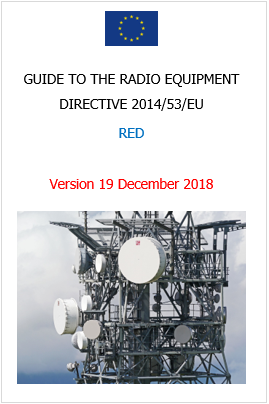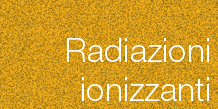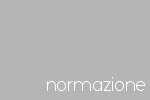
Guide to the radio equipment directive 2014/53/EU | December 2018
Version 12 December 2018
This Guide is intended to serve as a manual for all parties directly or indirectly affected by the Radio Equipment Directive 2014/53/EU (RED). It should assist in the interpretation of the RED but cannot take its place; it explains and clarifies some of the most important issues related to the Directive’s application. The Guide also aims to disseminate widely the explanations and clarifications reached by consensus among Member States and other stakeholders.
This Guide will be reviewed periodically to be kept up to date.
This Guide is publicly available, but is not binding in the sense of a legal act adopted by any of the EU institutions, even if the word 'shall' is used in many parts of this Guide. In the event of any inconsistency between the provisions of the RED and this Guide, the provisions of the RED prevail.
The services of the European Commission undertake to maintain this guide to ensure that the information is accurate and up to date. Errors brought to the Commission’s attention, will be corrected. However, the Commission accepts no responsibility or liability whatsoever with regard to the information in this guide. The information:
- is of a general nature only and is not intended to address the specific circumstances of any particular individual or entity;
- is not necessarily comprehensive, complete, accurate or up-to-date;
- sometimes refers to external information over which the Commission has no control and for which the Commission assumes no responsibility;
- does not constitute legal advice.
Finally, attention is drawn to the fact that all references to the CE marking and EU Declaration of Conformity relate to the RED only and radio equipment only benefits from the free circulation in the Union market if the product complies with the
provisions of all the applicable Union legislation. Reference is therefore made, whenever necessary but not always, to other EU legal acts.
The purpose of this document is to give guidance, subject to the preceding disclaimer, on certain matters and procedures pertaining to the Radio Equipment Directive 2014/53/EU (hereinafter referred to as 'the RED'), which is applicable as of 13th June 2016. This Guide brings together information previously available in several TCAM documents and related Commission’s websites.
The Guide is based on the RED and on the “New Legal Framework ” described in the “Blue Guide 2016” (the “Blue Guide”) and does not duplicate what is already contained in the Blue Guide which addresses horizontal issues. Hence, this Guide should be read in conjunction with the Blue Guide. Moreover, other more specific guidance or documents might be issued by the Commission services, TCAM or ADCO RED providing guidance or information on specific issues or items, for example:
-Supplementary Guidance on the LVD/EMCD/RED (combined equipment);
-Subclasses: class 1 equipment;
-Notification of draft interface regulations;
-National language requirements of the national implementation of the RED.
This version replaces the previous versions of 19 May 2017 and 5 June 2018.
...
Contents
Introduction
1 Scope
1.1 General
1.2 Geographic application
1.2.1 Application in non-EU States, countries & territories
1.2.2 Mutual Recognition Agreements (MRAs)
1.2.2.1 MRA with Switzerland
1.2.3 Agreements on Conformity Assessment and Acceptance (ACAAs)
1.3 Placing on the market
1.4 Putting into service
1.5 Special measures regarding radio equipment at trade fairs, etc
1.6 Radio equipment
1.6.1 What is radio equipment?
1.6.2 What is explicitly excluded from the scope of the RED?
1.6.2.1 Radio equipment exclusively used for activities concerning public security, defence, State security
1.6.2.2 Radio equipment used by radio amateurs
1.6.2.3 Marine equipment
1.6.2.4 Airborne equipment
1.6.2.5 Custom-built evaluation kits
1.6.3 Specific cases / examples (non-exhaustive)
1.6.3.1 Non-radio products which function with radio equipment/electrical and electronic equipment with non-electrical products
1.6.3.2 Infrared devices (IR)
1.6.3.3 Products that use electromagnetic waves exclusively for other purposes than radio communication and/or radiodetermination
1.6.3.4 Antennas
1.6.3.5 Amplifiers and other equipment intended to be connected to antennas
1.6.3.6 DVB receivers
1.6.3.7 Jammers
1.6.3.8 Construction kits
1.6.3.9 Specific components (radio)
1.6.3.10 Radio equipment installed in vehicles
1.6.3.11 Fixed Installations
1.6.3.12 Power plugs attached to radio equipment
1.6.3.13 RFID TAG
1.6.3.14 Cabling and wiring
2 Obligations of the economic operators
2.1 General
2.2 Manufacturer
2.3 Authorised representative
2.4 Importer
2.5 Distributor
2.6 Description of the manufacturer’s responsibilities
3 Essential requirements
3.1 General
3.2 Essential requirements applicable to all radio equipment
3.3 Essential requirements applicable only to a certain type of radio equipment
4 Interface regulations & specifications
4.1 Notification of radio interface specifications
4.2 Assignment of radio equipment classes
5 Harmonised Standards
5.1 Introduction
5.2 Generic harmonised standards vs product specific harmonised standard
5.3 Revision of harmonised standards
6 Notified bodies
6.1 Introduction
6.2 General concept
6.2.1 Annex III procedure — EU-type examination and conformity to type based on internal production control
6.2.2 Annex IV procedure — Conformity based on full quality assurance
6.4 Coordination between notified bodies
7 Market surveillance and enforcement
8 Delegated Acts, Implementing Acts and Commission Decisions
8.1 Delegated and Implementing acts
8.1.1 Delegated acts
8.1.2 Implementing Acts
8.1 Commission Decisions adopted under the R&TTED
9 Other applicable or related EU legislation
9.1 General
9.2 EU Environmental legislation
9.3 Applicability of RED with other EU acts on safety or EMC
9.4 General Product Safety Directive 2001/95/EC (GPSD)
9.5 Relationship between the RED and LVD/EMCD
10 Comparison R&TTED – RED
10.1.1 Changes between the scopes
10.1.2 Other changes (non-exhaustive list)
10.1.3 What happens with Commission Decisions taken according to R&TTED?
10.1.4 What happens with the “Alert sign”?
11 Transitional provisions for products falling under the scope of the RED
11.1 Applicability of the RED and the new LVD/EMC
11.2 General comments
11.3 Overview of the applicability of the Directives 2014/53/EU (RED), 2014/35/EU(LVD) and 2014/30/EU(EMCD)
11.3.1 Products within old LVD/EMCD and continue to be within new LVD/EMCD (even after applicability of RED)
11.3.2 Products within R&TTE that remain within the scope of RED
11.3.3 Products within old/new LVD/EMCD but then fall within RED (after applicability of RED)
For example pure television and sound broadcasting receivers
11.3.4 Products within R&TTED and then outside RED
For example pure wired telecom terminal equipment
ANNEX 1 — Organisations and committees mentioned in this document
ANNEX 2 — Acronyms and abbreviations
6.3 Information exchange
_________
Fonte: Commissione Europea
Collegati:



















